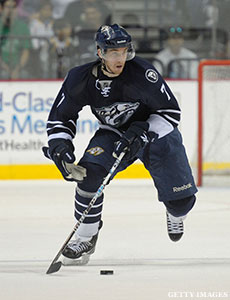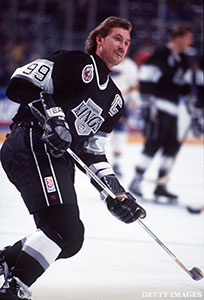
Jonathon Blum has heard all the one-liners about the beach.
As a professional hockey player who grew up in the heart of Orange County in California, Blum faced plenty of skepticism whenever he traveled to the East Coast or Canada to play in tournaments as a kid. "People would always be going, 'Hey, where's your surfboard?'" Blum says.

Well, the joke was on them. Although Blum did enjoy hitting the waves on the weekend, he was even better at hockey, and his childhood California Wave team ended up beating many of the traditional powerhouses, supposedly at their own game. The sport's growth in non-traditional regions over the past two decades has turned hockey into the game of Californians, Texans and Tennesseans, and Blum is the success-story poster child.
Born in Long Beach and raised in Rancho Santa Margarita, Blum blossomed into an elite defenseman. In 2007 he became the first California-born-and-trained player selected in the first round of the NHL draft.
Now an NHL rookie with the Nashville Predators, Blum was just a part of his franchise's first playoff series win, over his hometown team, the Anaheim Ducks. And it happened in a year in which all three California teams made the NHL playoffs together for the first time. (The Los Angeles Kings and San Jose Sharks are going head to head in another series.) Meanwhile, Canada only has two teams in the post-season this year.
Call it the return of the Wayne Gretzky Effect. It has been nearly 20 years since The Great One was traded from Edmonton to Los Angeles, but since then an entire generation of kids in California has grown up with hockey being a normal part of the sports landscape.
"What's happening in non-traditional markets is that the better athletes are starting to play hockey," Predators coach Barry Trotz says. "Instead of traditionally going for baseball or football, some of them are going, 'Hey, I can play hockey and make a go of it, even if I'm from California or Nashville.' "
Blum started playing street hockey when he was 5, and his favorite player was Kings defenseman Rob Blake. When he got older, he and his team started traveling more to play stronger competition.
"We'd go to tournaments and people would take us lightly even though we were probably the best team in the country in our age group," Blum says. "People took us for granted, especially early on, when the Wave started. Nobody knew much about us, so they'd say, 'Oh, yeah, a team from California? Huh?' But then over the years, we'd place first or second in a lot of tournaments, and it was more like, 'Hey, we want to invite the California Wave to our tournament.' "
Trotz got a taste of this during the NHL lockout in 2005 when he attended a major international youth tournament in Kelowna, British Columbia.
"The L.A. Selects just clobbered the Kelowna team that was ranked really high in British Columbia," Trotz says. "It was like 9-1, and I'm going, 'You're kidding me. These Californians?' Then in the finals of that tournament, it was the L.A. Selects and the Green Bay Gamblers. It just tells you that hockey in non-traditional markets is growing."

Following Blum's trail, two Californians -- Beau Bennett of Gardena and Emerson Etem of Long Beach -- were taken in the first round of the 2010 NHL draft, which was held at Staples Center. Despite the advances, California players can still face some of the same stereotyping.
"People who know hockey can tell someone is a good player no matter where they're from," Blum says. "But Californians can get marked as being soft, skilled players who just want to play offense all the time."
Blum has also defied another stereotype that players who grow up outside of a puck-centric culture lack a feel for the game.
"Several coaches both inside and outside of California have told me Jonathon's hockey sense is incredible, and one prominent California minor hockey coach has called him the smartest player he ever coached," says Chris Bayee, the author of a forthcoming book about the growth of hockey in California.
Trotz offers a similar assessment: "He's one of those guys that you can tell him something once and he's got it. You don't have to pound him over the head, reminding him. He's a real student of the game. Very acute in his observations. He does a lot of subtle things. He's got a stick like Nicklas Lidstrom, who doesn't pound guys but controls people with leverage and his stick. He reads plays developing and he can connect the dots with what's going to happen down the road."
Blum moved to Vancouver when he was 16 to play four seasons of Canadian major junior hockey, but his home is still in the O.C. His parents have season tickets for the Ducks, and before the start of this series, the last time he had been in the Honda Center was as a fan in 2007 when Anaheim won the Stanley Cup.
"He's in the stands watching, and he knows he can still live out his dream of being a hockey player," Trotz says. "Twenty years ago that wasn't a dream for most guys in California."




